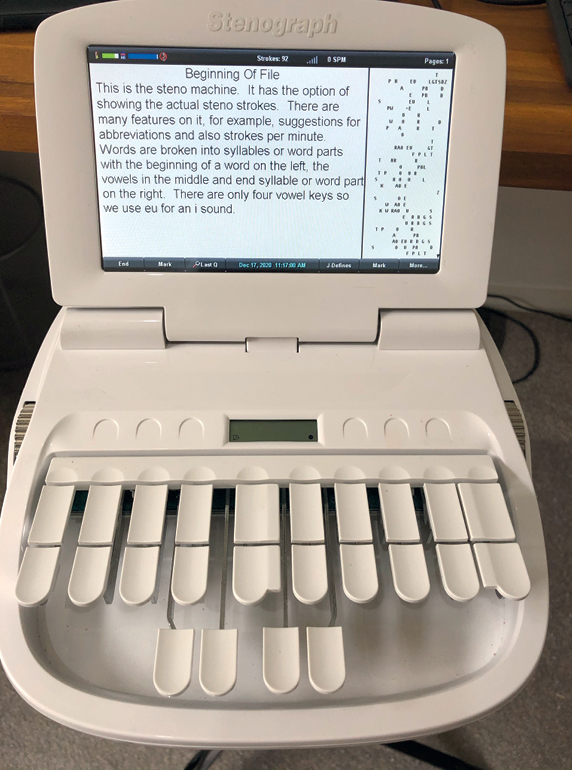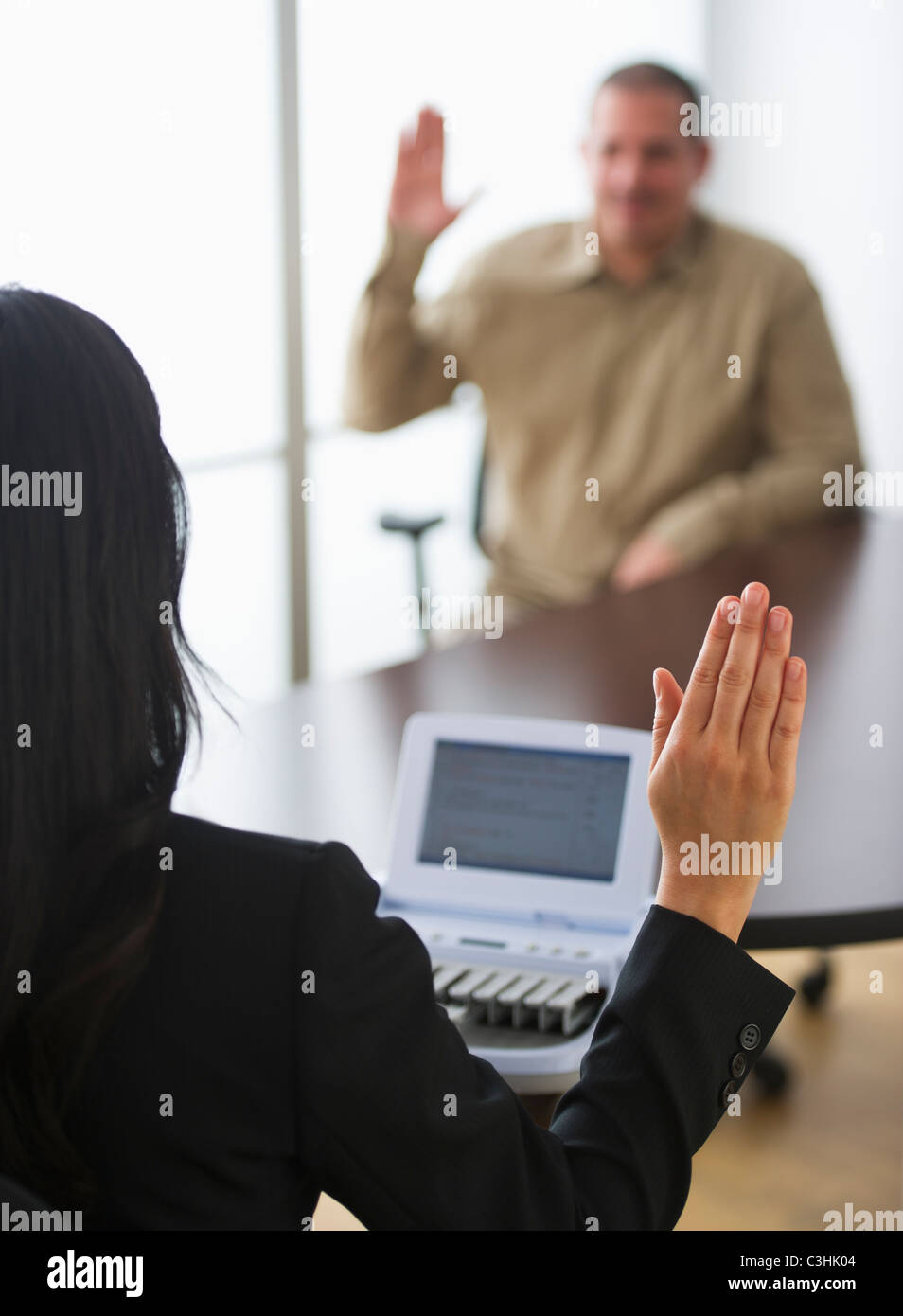Discover the Crucial Skills and Duties of a Court Typist in Today's Legal Landscape
As a court typist, you hold an essential setting in the legal system. Your abilities surpass simply inputting; they entail comprehending complicated lawful terms and treatments while making certain precision in every file. You work together very closely with judges and attorneys, making your duty vital for reliable interaction. What specific skills do you need, and just how can you adjust to the ever-evolving technical landscape? Let's discover this even more.
The Function of a Court Typist in the Judicial System
As the foundation of the judicial system, a court typist plays a crucial function in guaranteeing that legal proceedings are precisely recorded. You are in charge of transcribing every little thing from witness statements to judges' judgments, capturing every detail with accuracy. Your job assists preserve a clear and irreversible record of court tasks, which is important for future referral and appeals.In the courtroom, you're frequently the unhonored hero, silently guaranteeing that all spoken words become created records. You keep confidentiality, recognizing the sensitive nature of legal issues. You likewise team up very closely with staffs, courts, and legal representatives to assure the smooth flow of information. By working successfully under pressure, you add to the general effectiveness of the judicial process. Your attention to information and dedication to precision not only maintain the stability of the court however additionally sustain the broader quest of justice in culture.
Essential Skills Needed for Court Typists
Court typists need an one-of-a-kind mix of abilities to stand out in their crucial duty within the judicial system. You need to have excellent keying abilities, usually achieving rates of 70 words per min or even more. Precision is crucial; also a minor mistake can bring about significant misunderstandings in lawful papers. You'll also require solid attention to information, guaranteeing every word is recorded correctly.Additionally, good organizational abilities are vital for taking care of numerous instances and records successfully. Being tech-savvy is crucial, as you'll make use of various software application for word processing and paper monitoring. Solid interaction abilities aid you interact with courts, lawyers, and various other court personnel effectively.Lastly, a feeling of professionalism and confidentiality is a must, as you'll take care of sensitive information daily. By refining these abilities, you'll be well-prepared to contribute significantly to the court environment.
Understanding Lawful Terms and Treatments
As a court typist, you require to grasp vital legal terms and treatments to do your task effectively. Understanding these ideas not just helps you record precisely yet additionally assures you can adhere to the flow of court process. Let's check out the crucial legal vocabulary and an overview of court processes you must know.

Key Legal Terms
Comprehending key lawful terms is important for any individual operating in a court room setting. You'll regularly encounter terms like "plaintiff," which describes the individual launching a suit, and "offender," that replies to the allegations. Understanding the distinction in between "civil" and "criminal" cases assists you understand the context of the proceedings. Knowledge with "subpoena" assurances you understand the lawful files compelling witnesses to affirm. Furthermore, terms like "proof" and "statement" are crucial, as they relate straight to the info presented in court. Grasping these terms not only enhances your effectiveness as a court typist but additionally assures that you contribute to the precision and clearness of lawful documents. Your function pivots on accurate terms, so don't take it lightly!
Court Procedures Summary
Familiarity with key legal terms sets the phase for comprehending court procedures. Comprehending how a court features is critical for any kind of court typist. You'll come across procedures like arraignments, where accuseds listen to costs, and motions, which are demands for a court judgment. Familiarize on your own with the roles of judges, attorneys, and clerks, as each plays a crucial part in process. Knowing the circulation of a test-- from court choice to shutting arguments-- helps you accurately record the procedures - court typist. In addition, recognizing the value of maintaining a exact and unbiased document can not be overstated. By understanding these components, you'll improve your effectiveness in recording important court activities and contribute considerably to the legal process. Your role is essential in maintaining the integrity of court records
The Effect of Technology on Court Entering
Technology's transformed court inputting in significant methods. With digital transcription devices, you can raise performance and accuracy, making your job easier than ever. Plus, remote court procedures have transformed just how you approach your work, needing adaptability to brand-new layouts and technologies.
Digital Transcription Devices
As digital transcription tools remain to evolve, they're transforming the way court typists do their obligations. These tools streamline the transcription procedure, permitting you to capture talked words precisely and efficiently. With voice acknowledgment software, you can transcribe real-time proceedings, lowering hand-operated input and decreasing errors.Moreover, cloud-based systems allow easy accessibility to papers, so you can function collaboratively with legal groups and guarantee everyone's on the same page. Automated formatting features save you time on repetitive tasks, allowing you focus on material quality.Additionally, digital devices enhance security, securing sensitive details via encrypted storage and controlled accessibility. By embracing these modern technologies, you can boost your performance and maintain the high standards best site needed in the lawful field.
Remote Court Proceedings
The rise of remote court proceedings has substantially changed the landscape for court typists. You currently rely upon modern technology to capture and transcribe live hearings from your office or home. Experience with video clip conferencing systems is necessary, as you'll need to browse them flawlessly to guarantee an exact record. You'll additionally need to handle audio quality, as history noise or link problems can disrupt your work. Furthermore, remote process demand quick thinking; you might need to clear up statements or request repeats in real-time. Staying arranged and reliable is vital, as target dates remain limited. Welcoming these technological improvements not only boosts your skills however additionally guarantees you stay an important asset in today's developing legal environment.
Precision and Focus to Information in Transcription
Accuracy and attention to detail are crucial in transcription, specifically for court typists. court typist. Every word counts when you're transcribing legal proceedings. A single error can modify the significance of a declaration, possibly impacting the end result of a situation. You should pay attention carefully, ensuring that you record every nuance and inflection in the speaker's voice.Your capacity to capture typos and grammatic errors is important. You do not just type; you validate have a peek at this website that the last document is a precise depiction of what was claimed in court. This calls for an eager eye and a comprehensive understanding of lawful terminology.Moreover, you'll need to be acquainted with different accents and talking designs, as courtrooms can hold a variety of audio speakers. By sharpening your precision and attention to information, you'll preserve the integrity of legal records and add markedly to the judicial process. Your persistance in this area truly makes a difference

Time Monitoring and Organizational Skills
While managing multiple tasks, efficient time administration and organizational skills are important for court typists. You'll frequently manage numerous target dates, from recording court proceedings to preparing legal files. Prioritizing your workload is important; determine immediate jobs and tackle them first to guarantee prompt submissions.Organizational abilities come into play when you're arranging with instance notes, data, and transcripts. Keeping everything neatly categorized not only conserves time yet additionally minimizes the risk of error. Making use of devices like calendars, to-do listings, or specialized software application can aid you remain on track and manage your time effectively.Moreover, setting details goals for each and every job session can improve your efficiency. Damage larger jobs right into smaller sized tasks to make them much more workable. By refining these abilities, you'll not just enhance your effectiveness but also contribute considerably to the smooth operation of the legal procedure, ensuring everything runs like clockwork.
Proceeding Education and Professional Advancement Opportunities
Investing in your abilities doesn't quit with time management and organization. As a court typist, you'll locate that continuing education and professional advancement are important to remaining competitive in the lawful field. Try to find workshops or on the internet courses concentrating on innovative typing strategies, lawful terms, and transcription software application. These next page can sharpen your abilities and aid you adjust to the current technologies.Networking is similarly crucial. Sign up with expert organizations like the National Court Reporters Organization (NCRA) or regional lawful associations. They typically offer sources, training sessions, and seminars that can boost your understanding and link you with peers.Don' t ignore qualification programs that can boost your trustworthiness and marketability. Staying upgraded with the most up to date trends and ideal techniques in legal paperwork will boost your performance and precision, making you an important asset to any type of legal team. Buy your growth, and you'll enjoy the benefits throughout your profession.
Frequently Asked Questions
What Is the Typical Wage Variety for a Court Typist?
A court typist's normal wage arrays from $30,000 to $55,000 every year, relying on experience and place. You could likewise find possibilities for growth with added abilities, bring about enhanced pay in the lawful field.

Are Court Typists Required to Have a Legal Degree?
Court typists don't require a lawful level, but having one can be advantageous. You'll commonly locate that strong keying skills and knowledge of legal terminology are more crucial for success in this role.
What Are the Work Hours for a Court Typist?

Exactly How Do Court Typists Make Sure Privacy in Their Work?
You guarantee confidentiality by securely managing delicate documents, utilizing encrypted software program, and adhering to strict procedures. You remain familiar with personal privacy legislations and only share info with authorized personnel, preserving trust fund in the judicial procedure.
Can Court Typists Work From Another Location or Freelance?
Yes, you can function remotely or freelance as a court typist, specifically if you have dependable technology and a secure setting. Several lawful specialists currently welcome remote work, supplying flexibility and possibilities for independent typists. As the foundation of the judicial system, a court typist plays a necessary duty in assuring that legal procedures are properly recorded. As a court typist, you need to grasp key lawful terms and procedures to do your work effectively. Understanding these terms not only improves your effectiveness as a court typist but likewise ensures that you add to the accuracy and quality of lawful files. The surge of remote court procedures has actually substantially transformed the landscape for court typists. As a court typist, you'll discover that continuing education and professional growth are necessary to staying affordable in the legal field.